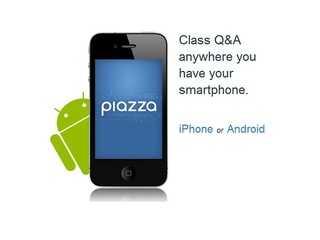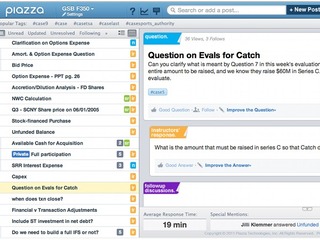
Learn how to code with Stanford and Piazza
Stanford's free iOS app-making course is back with help from Piazza

Sometimes, while talking to amazing app creators, I start thinking: "I should create an app. I could create some kind of gardening app that will help me keep plants alive longer." It takes a few seconds for the cold, dark reality to set in: I don't know how to code.
Well, if you're looking to learn to create a gardening app of your own--or...a better, cooler app--you can always go back to school.
Stanford is gearing up to offer its wildly popular free online video course in iPhone and iPad app creation. But this time, the summer course that has drawn hundreds of thousands of aspiring app creators is getting a new social twist with the help of Piazza. The online forum for study help will allow the multitudes of students who sign up for the course get help from their peers.
Since the free 10-week summer course was first offered in 2009, it’s drawn a huge number of would-be app creators (who don’t get course credit, but do get the right to put a Stanford license plate frame on their car [not really]). Piazza founder and CEO Pooja Sankar isn’t entirely sure what to expect.
“We know that over 400,000 people have subscribed to prior versions of this course on iTunes U, but many of them may have already learned the material. So we are being fairly conservative in our thinking about this first course. However, because we've made it easy to get started, it's likely that other schools will take note of what can be done here and choose to add social learning to their own classes on iTunes U,” said Sankar, adding: “That could create significant traction across many schools — including some of the hundreds of US universities where Piazza already has a presence.”
Coincidentally, Sankar was a grad student at Stanford’s Graduate School of Business, and while the first free app-making course was offered in 2009, she was busy creating Piazza, an online social community built around individual classes to allow students and professors to work together outside of the classroom to get a better grasp on the material. Designed to expedite the traditional Q&A process, unanswered questions are highlighted in red to grab attention, and if a student answers another student’s question correctly, the instructor can approve it as a good answer, which highlights the post with a green “instructor endorsed” label. The average response time for a student’s question is 12 minutes.
Sankar says 250,000 students have used Piazza since the site came out of private beta in January 2011. Stanford was—of course—one of the first schools to try out Piazza while it was in private beta mode, and several hundred classes at Stanford have since used Piazza to supplement student learning.
The online video course is based on the classroom version offered by Professor Paul Hegarty. Last fall, Hegarty and the 74 students and teaching assistants involved in the classroom course used Piazza to enhance their learning experience, and they ended up making more than 1,850 contributions to the class on Piazza.
The free 10-week course has proven wildly successful in the past. When it debuted in 2009, it made iTunes U history by reaching one million downloads in just seven weeks. On average, individual lecture videos have been downloaded 10 million times.
Registration for the class is now open.
Related Companies, Investors, and Entrepreneurs
Piazza
Startup/Business
Joined Vator on
Founded in 2009 and publicly launched in 2011, Piazza is a free online gathering place where students can ask and answer questions 24/7, under the guidance of their instructor. Anyone can create a class at Piazza.com to initiate class discussion. Students spend on average four hours a night on Piazza working together in real time with classmates and instructors to find the answers they need at the time they need them. Piazza is FERPA-compliant and used in hundreds of colleges and universities.

Pooja Sankar
Joined Vator on
Pooja Sankar is the founder and CEO of Piazza, on online gathering place for students and instructors. She has worked at Facebook, Kosmix, and Oracle, and has degrees from IIT, UMD, and Stanford.Related News


Ed. network Piazza sees 100% growth in one month

Classroom interface Piazza launches free mobile app

